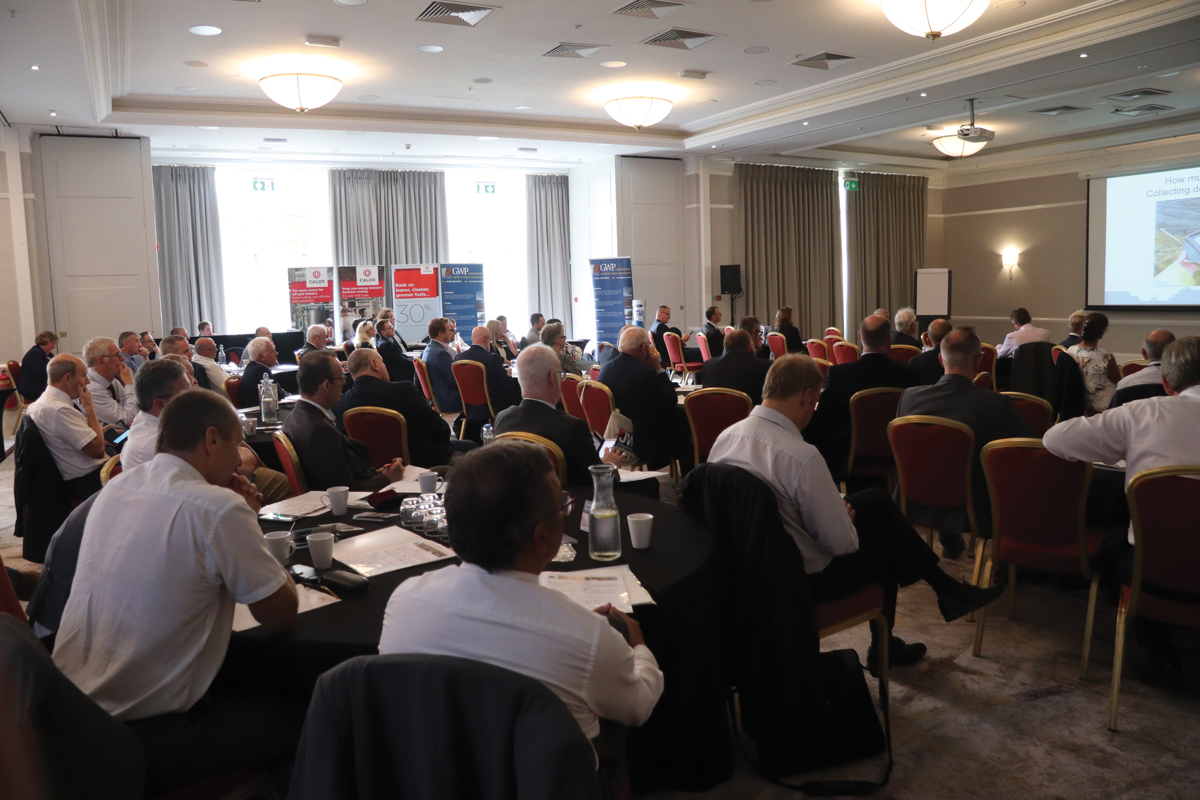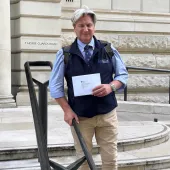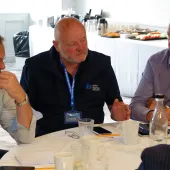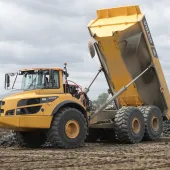BAA Annual Conference 2019

First published in the August 2019 issue of Quarry Management
QM reports on the British Aggregates Association’s 2019 annual conference seminar proceedings
This year’s British Aggregates Association Conference proved to be yet another success with some 100 delegates attending the annual meeting, which was held at the Forest of Arden Marriott Hotel and Country Club, in Birmingham, on Monday 17 June.
The event focused on a number of key themes/issues of particular interest and concern to BAA members and associates, including: health and safety best practice; developments in education and training; and current environmental and planning matters.
The small exhibition associated with the BAA 2019 annual meeting saw stands from Calor, Command Alkon, DXB Motors, DUO, DustScanAQ, Herbst Software, GWP Consultants, HSE, Influential Management, John White, Longfloor, Mitsubishi Electric, MPQC, QNJAC and Quarry Design.
With a packed programme of presentations to deliver, as well as the Quarry of the Year Award and lunch to fit in, the morning session, chaired by long-serving BAA secretary Peter Huxtable, kicked off with six 15-minute cameo presentations on a diverse range of industry-related topics.
Focusing on sustainability and the development of innovative ideas and projects that will help shape the future of businesses in the mineral products sector, Dr Peter Gunning and Dave Olley from Carbon8 Aggregates, in a joint presentation, gave an insight into the production of ‘carbon-negative’ aggregates.
The company has successfully put its patented accelerated carbonization technology (ACT) into commercial operation to create what is said to be the world’s first truly carbon-negative aggregate. Mr Olley, however, outlined some of the challenges associated with sustainable manufactured aggregates and the steps needed to address Carbon8’s technology as proven, reliable and one that offers a sustainable alternative for the waste-recycling and construction products sectors.
Using examples and case studies, Dr Gunning discussed the benefits of Carbon8’s ACT system and how it combines CO2 gas with industrial wastes (eg cement dusts, steel slags, contaminated soils) to produce a viable and sustainable replacement for traditional building materials.
Looking ahead, both Mr Olley and Dr Gunning spoke about the exciting opportunities for Carbon8, with the possibility of adding further commercially operated ACT plants to the existing sites in Leeds, Brandon (in Suffolk) and Avon (near Bristol). Mr Olley added the expansion will no doubt protect natural resources, remove waste from landfill and continuously promote sustainable construction.
Next to speak was Dr Geoffrey Walton, managing director of DustScanAQ, who gave a talk on the importance of dust monitoring in quarries, most notably respirable crystalline silica. Anyone operating or managing a quarry is required, under HSE guidance, to reduce the exposure of staff, contractors and those living near a plant to silica dust generated by their operations.
Dr Walton recommended the need for appropriate dust and air-quality monitoring/analytical methods in the mineral products sector given its potential emissions and related traffic impacts. The underlying message of his presentation, however, was effective dust monitoring and collection for businesses makes sense from both a production and a health and safety point of view.
With rising energy costs driving operators to seek increasingly innovative sources of fuel, Kev Houlden and Mark Gilks of Calor, the UK’s leading provider of liquefied natural gas (LNG), discussed how LNG can deliver considerable financial and environmental benefits, and help customers manage their machinery fleets cost-effectively and efficiently.
One site that has already made the switch to LNG is Aggregate Industries’ Colemans Quarry, in north Somerset, which produces 250,000 tonnes of asphalt per year. Mr Gilks emphasized how switching from kerosene to LNG, a cleaner source of energy, has helped the company to substantially cut its asphalt plant’s fuel costs while reducing CO2 emissions by 17% annually.
Nick White, a senior advisor for Natural England, outlined the process and progress of the Government’s proposals to make biodiversity net gain necessary for developments when granting planning permission. Biodiversity net gain is an approach that aims to leave the natural environment in a measurably better state than beforehand.
Mr White said mandating biodiversity net gain puts the environment at the heart of planning and development, driving measurable improvements for all aspects of the environment such as air quality, flood defences and clean water.
Staying with the environmental theme, Simon Ruffles, managing director of DXB Pump & Power, looked at the implications of EU Stage V emissions legislation on quarry plant and equipment. In particular, he explained how utilizing Stage V engines can reduce fuel usage, carbon emissions, maintenance and ongoing operational costs of dewatering and process pumpsets.
In an industry focused on reducing running costs and improving efficiency, Mr Ruffles urged quarry operators to make the move to Stage V sooner rather than later. The onus is on OEMs to produce compliant engines and he pointed out that leading manufacturers can now offer customers optimized technology that thoroughly fulfils their operational needs, from maximizing uptime and reliability to increased fuel efficiency.
In the final cameo presentation of the morning, John Wilkinson, chief executive officer of MPQC, spoke about some of the new/current industry qualifications and initiatives offered by the organization and its divisions – MP Skills, MP Awards and MP Futures.
He reiterated the importance of training and development in the workplace and explained the need for individuals and contractors to demonstrate competence through industry-recognized qualifications and standards, such as the MPQC Driver Skills Card and Minerals Sector Safety Passport.
He also outlined MPQC schemes and initiatives in the pipeline, including the new online Nexus database, which will have training records for over 150,000 people and other key information in relation to CPD and searching/booking plant training courses. Another new development for the organization will be the launch of a ‘virtual smart card’ in 2020 that will ensure operatives have the correct skills and competence to work on site.
The digital technology will give contractors data visibility on their hand-held devices which they can use to instantly access their CPD records, training and qualifications, reducing the need to carry a physical card on site and the possibility of fraud.
The morning session was concluded by Steve Cole, chair of BAA AOS (Assessment of Operating Standards), who spoke about the importance of continuously delivering a safer, more visible and healthier quarry workplace for employees, and urged more SMEs to take part in the Site Assessment Scheme.
This year CCP’s Wardlow Quarry, in Staffordshire, was awarded the BAA Quarry of the Year accolade, while AOS certificates were presented to CCP (Aberdo Quarry, Flintshire), Hugh King/Tillicoultry Group (Hullerhill Sand Quarry, North Ayrshire) and Summerleaze (Bray and Denham Quarries, Berkshire).
After lunch, the afternoon seminar session commenced with a special presentation to BAA founder member and executive director Roger Cullimore for his long and committed service to BAA operators and the wider UK quarry industry. BAA secretary Peter Huxtable said the industry recognition was both fitting of the gentleman that Roger is, and a perfect way for him to bow out.
He commented: ‘Roger leaves this industry in a far better place that that in which he found it. I’m more than aware of the impact he has had in the South West, and in particular Gloucestershire, a county that is very close to his heart.
‘But it is his vision and pragmatism over the years that have been instrumental in ensuring the aggregates industry has continually moved forward on a UK-wide scale. Without Roger, much of what we are achieving across the UK today wouldn’t exist.’
Under the heading ‘Collaboration is the Secret to Achieve Zero Harm’, James Thorne, chief executive officer of IQ, Colin Mew, Principal Inspector of Quarries at the HSE, and John Wilkinson, MPQC chief executive officer, took part in a Q&A panel discussion chaired by Viv Russell, chair of QNJAC (Quarries Joint National Advisory Committee).
Mr Russell reminded everyone of the significance of improving health and safety performance across the supply chain and that sharing best practices and innovative ideas is key to making the workplace safer, raising standards and meeting the industry’s Zero Harm objectives.
Next to speak and rounding off the BAA seminar proceedings was former England and British Lions Rugby Union player, Rory Underwood, who gave a lively speech and demonstration to delegates about how strong awareness, teamwork and focus can lead to improved business performance.
The underlying message of Mr Underwood’s presentation was the importance of reaching out and engaging with employees. Undoubtedly, the quarrying industry’s most valuable asset is the strength in depth, skill and expertise of its workforce, and he stressed the need for businesses to promote better worker engagement, helping staff to develop their skills, expertise and, ultimately, fulfil their potential.
- Subscribe to Quarry Management, the monthly journal for the mineral products industry, to read articles before they appear on Agg-Net.com








